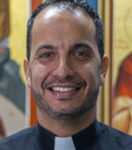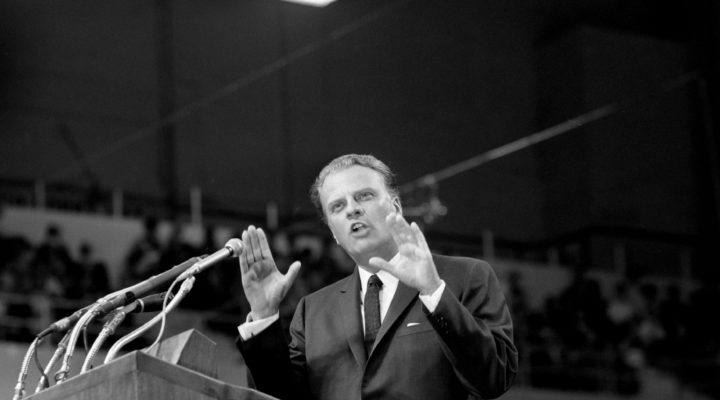The death of Billy Graham has evoked, once again, amazement at the evangelist’s unparalleled spiritual impact on American faith and culture.
But it’s also stirred speculation about how long, and in what ways, Graham’s influence may endure.

Billy Graham
Graham, 99, died at his home in Montreat, N.C., a small mountain community near Asheville, shortly before 8 a.m. Wednesday. The Billy Graham Evangelistic Association announced he died of causes related to aging.
The organization also said Graham preached more than 400 crusades during his pioneering evangelistic career, reaching 215 million people in more than 185 countries.
He brought in many of them with charisma and a dynamic preaching style that played well on the relatively new medium of television. So did his emphasis on compassion, faith and love over theological, denominational and political divisions.
His approach made Christianity appealing, said Molly Marshall, president and professor of theology and spiritual formation at Central Baptist Theological Seminary in Shawnee, Kan.
“Billy Graham modeled passion for the gospel in his proclamation and life,” she said.
Just about any Baptist who grew up during the height of Graham’s ministry has stories about how they, or someone they know, were impacted by the evangelist.

Bill Leonard
“Billy Graham extended the revivalistic method that resonated with Baptists,” said Bill Leonard, professor of Baptist studies and church history at Wake Forest University Divinity School in Wake Forest, N.C. He had also belonged at one time to a Southern Baptist church.
But Graham’s ecumenical approach to crusades spread his inspiration far beyond Baptist life.
Inspiring hope in ministry
“He was like a magnet and people were drawn to him and his message and to the way he lived his life,” said Nicholas Louh, pastor of St. John the Divine Greek Orthodox Church in Jacksonville, Fla.
Louh grew up in an Orthodox family that watched Graham crusades on television. Initially, he was drawn to the evangelist’s charismatic appeal, but later began to notice how positive the sermons were.

Nicholas Louh
“I began to listen to the content of his messages and … you never knew where he was politically because that wasn’t part of his stance. His messages were so inclusive.”
Graham’s approach had significant impact on Louh. It was one of the reasons Louh entered seminary and why he later pursued doctoral studies at Gordon-Conwell Theological Seminary, which was co-founded by Graham.
Louh’s own approach to ministry focuses on faith and spirituality instead of doctrinal or political issues. He also is heavily involved in ecumenical outreach in Jacksonville.
Louh credits Graham for that inspiration.
“That’s the kind of pastor I would like to be, a pastor who is inclusive and gives people hope,” Louh said.
‘In a zone unto himself’
Graham had already faded from public view and influence for several years by the time of his death on Wednesday. Scholars already are noticing that knowledge about him is sketchy among younger generations.
“Billy Graham is much less known now,” said Leonard. “My students know Franklin Graham” more than they do his father.
But that will not dislodge the elder minister from his place atop the pantheon of American evangelists and religious leaders, Leonard said.
“Billy Graham is in a zone unto himself in terms of American religion.”
Graham is the last of the great stadium preachers, following in the footsteps of immensely popular evangelists and crusaders like Charles Finney, Dwight Moody and Billy Sunday among them.
But none of those men or others ever rose to the level Graham. Coming at the beginning of the age of television, Graham grabbed headlines and new Christian commitments around the globe. In the U.S., he essentially became America’s Protestant chaplain, Leonard said.
Graham also became known as the “Pastor to the Presidents” and was frequently seen in White House photographs speaking casually with, or giving counsel to, commanders-in-chief from Harry S. Truman to George W. Bush.
“No one has done that like Graham,” Leonard said.
Preaching grace, not law
It’s why Billy Graham was still a household name when Bill Wilson got his start in ministry more than 30 years ago.

Bill Wilson
“I think at every church I pastored there were people who were converted at a Billy Graham crusade,” said Wilson, director of the North Carolina-based Center for Healthy Churches and a member of the Baptist News Global board of directors.
“Graham was the right man in the right place at the right time with the right method.”
But it was also a fact that most of those folks were in their 50s, 60s and 70s. Not long after church, faith and culture began to change and, with those shifts, huge gatherings began to lose their luster.
“Then that methodology was no longer effective,” Wilson said.
Since then, no one as risen to take Graham’s place — and there are several reasons for that, Wilson said.
“That’s less about the fact that others can’t preach as well as Billy Graham … as it is the context of our culture has changed,” Wilson said. “It has changed so much that even Billy Graham would have had limited success in the 21st century.”
Those still doing large-scale evangelism are approaching it largely from a prosperity gospel perspective.
“And they are preaching to supporters, not to reach people,” Wilson said.
Technological change also is a factor. Crusades and other mass events lost impact “in a wired, interconnected world,” he said.
The crusade mentality works where it is new, Wilson said, not in cultures where the gospel has already been widely shared and even become politicized.
“People can become so overexposed that they become calloused to” the message.
One of Graham’s approaches to ministry that remains effective is to be non-judgmental, non-partisan and ecumenical, Wilson said.
“He preached grace and not law and that has always irritated a certain group of fundamentalists in our culture.”
Avoiding controversy
Graham certainly was known for publicly avoiding controversial issues.

Molly Marshall
Central Seminary’s Marshall witnessed that first hand in 1973 when she was a student at Southern Baptist Theological Seminary in Louisville, Ky.
“Billy Graham had been invited on campus to have an open exchange with the student body in the chapel,” said Marshall. She was in her first year at the time.
“I was pretty new to it, so I asked a question: ‘What do you believe the Bible teaches about the ordination of women?’”
Some of those gathered in the chapel were agitated by the question. Some even booed. Others clapped.
Graham dodged.
“He said this isn’t the place to discuss that,” Marshall said. “I retorted that I thought the seminary was precisely the place to discuss such things.”
Even so, Marshall said Graham moved the needle on other important issues for Christians.
‘A lasting impact’
One of those was furthering ecumenical relationships.

Steve Harmon
“In the context of conservative evangelicals, he broke a lot of fresh ground in crossing ecumenical barriers,” said Steven Harmon, associate professor of historical theology and an expert on the ecumenical movement at Gardner-Webb University School of Divinity in Boiling Springs, N.C.
Billy Graham crusades required citywide involvement of churches from different denominations working together in the planning, hosting and aftermath of the events. It was common to have evangelical, mainline and Catholic congregations working side by side for months at a time. In places, those relationships endured.
“I think that has had a lasting impact,” Harmon said. “There is a kind of evangelicalism that is much more ecumenically engaged because of what he did with the crusades.”
‘For that, I admire him’
Graham’s approach to evangelism has also helped some believers shunned by much of the church world: LGBTQ Christians.
Terri Steed Pierce said she was introduced to Christ and the church through her mother, who was saved earlier in her life at a Billy Graham crusade.

Steed Pierce
For many Baptists growing up in North Carolina, Graham evoked a kind of reverence, which Steed Pierce said included her — and still does.
“I attribute my understanding of who Jesus was, and the passion I come to it with, to the influence he had on her life,” said Steed Pierce, pastor of Joy Metropolitan Community Church in Orlando, Fla.
It was as much about what Graham didn’t say in his crusades that helped when Steed Pierce began to embrace her sexuality and her faith.
“I was grateful Billy Graham just stuck to the gospel. The church has bellied up to the Republican Party, but he just stayed clean of that and stuck to ‘God loves you.’”
If nothing else, Graham’s legacy left one model of how to focus on unity over strife.
“Our affiliations divide us more than bring us together,” Steed Pierce said. “He didn’t involve himself with those things … and for that I admire him.”


